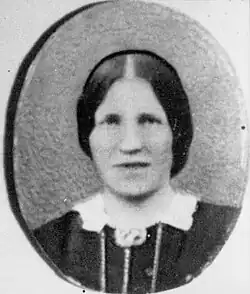Helen Gibb was born at Wester Eggie farm in the parish of Cortachy and Clova, Forfarshire, Scotland, on 9 July 1838, the daughter of Helen McAndrew and George Lindsay.[1] She worked as a dairymaid from the age of nine. On 18 November 1858 she gave birth to a son, James; the father was probably Stewart Gibb, a shepherd. The couple became engaged, and Stewart Gibb left for Canterbury, New Zealand, in 1860 to improve his prospects, travelling on the Matoaka. Helen and James remained in Scotland until 1863, when they travelled with Stewart Gibb’s brother James and his wife on the Accrington, arriving in Lyttelton on 5 September 1863.
On 17 September 1863, twelve days after her arrival, Helen Lindsay married Stewart Gibb at Cameron’s Hotel, Saltwater Creek, on the way to Teviotdale station where they were to work as a married couple. They lived there for three and a half years and had two more children, Stewart and George. In 1864 Helen set out on horseback to Amberley for the birth of her second child, but her son Stewart was born in a sod hut near Brown’s Bridge with only her husband present.
On 2 March 1867, while pregnant with her fourth child, Helen Isabella (Ella), Stewart Gibb drowned in the Motunau River. He had purchased 60 acres at Cabbage Tree Flat near Motunau, and Helen decided to farm the land. She built a sod cottage, later replacing it with a four-room wooden house. With the help of her children she kept cows, sheep and pigs, and planted an orchard. She imported gorse seeds from Forfarshire for fencing and guarded them carefully. In one boundary dispute with neighbour William Acton-Adams, she confronted him with a Bible and quoted scripture; he left the boundary as it was.
In the early 1870s, a road to Cheviot passed close to her farm. She began providing accommodation to travellers, drovers, and coach passengers. Her accommodation house was the only one on the Amberley-Cheviot road for many years. By 1882, she had purchased an additional 75 acres, which her sons farmed.
Known as the "Queen of Cabbage Tree Flat", her house was a community centre. She served as postmistress from 1883 to 1901, and Presbyterian church services were held in her home until the Greta Valley School was built at Motunau in 1893. After the railway reached Scargill in 1902, Motunau declined as a hub, but Helen continued to host travellers and board her grandchildren for school. Her daughter Ella lived with her, and her sons worked the farm.
She died at Motunau on 30 July 1914.[1]
